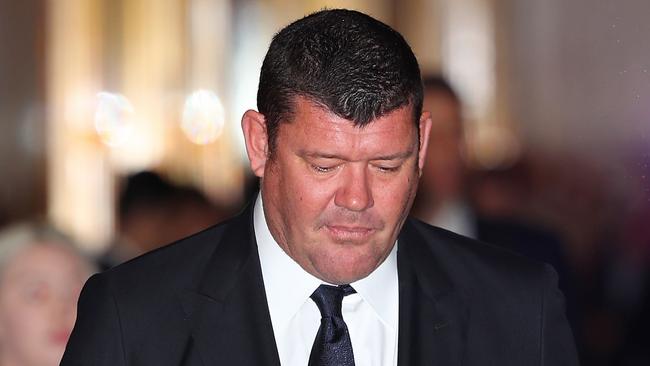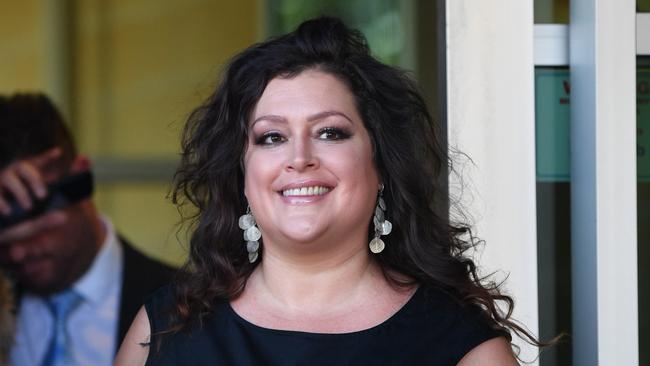How did James and Tziporah get here?
TWO decades on from the end of their infamous relationship, James Packer and Tziporah Malkah still share a tragic common link, writes Juliet Potter.
Rendezview
Don't miss out on the headlines from Rendezview. Followed categories will be added to My News.
BEFORE the invention of social media, the Sydney social scene of the 1990s was abuzz with the likes of Melissa Tkautz, Toni Pearen, Peter Andre, Elle Macpherson, and Russell Crowe; all regular features in gossip pages of magazines and newspapers.
In this time, pre “followers” or “likes”, were two prominent “influencers” who were separately making their mark — James Packer and Kate Fischer.
James, the son of Australia’s wealthiest man, Kerry Packer, born into immense wealth and privilege, was in the throes of establishing in the business world.
Kate, a successful teen Dolly competition winner, had moved to Sydney and was modelling for the likes of Vogue, GQ and Elle. Her star had fast ascended, transitioning her into both television and film roles, and by the time she met Australia’s most eligible bachelor in 1993, she was already on the fast track to a life most could only dream of. He was as smitten with her as the public was with their romance.
They were the Brangelina of their time; Australia’s golden couple. Touted as the “Prince and The Showgirl”, they were seen at Sydney’s hottest venues, hobnobbing with the elite. They were young, healthy, beautiful, in love, and had the world at their feet. She even admitted in an interview with A Current Affair this week that she “had it all”.
But after five years together and a two-year engagement, they suddenly split. James offered Kate a $2.7 million Bondi apartment, a few hundred thousand, her $500,000 engagement ring, and their lives went separate ways. Or so it seemed.

Now, 20 years on, the pair have somehow found themselves in the same place again, yet worlds apart, reunited by one thing — mental illness.
After announcing he would take a break due to ongoing depression and anxiety issues in March, James Packer was immediately housed in one of the US’s top mental-health facilities. Upon entry to the $35,000-a-week hospital, he was surrounded by family and friends. Media outlets and wellwishers including the Prime Minister threw their support behind the mogul, and applauded him for speaking out about his mental illness.
At the other end of the spectrum is Kate, now known as Tziporah Malkah, battling her own demons, struggling to find care for her ongoing mental illnesses. By her own account, she’s been homeless and lived in a women’s refuge in Melbourne. Ironically, she was estranged from her mother Prue Goward for a time, a woman who is the current NSW Minister for Social Housing.
To date, Tziporah continues her fight to get well, if only to enable her to financially support and house herself.
Living a hand-to-mouth existence, Kate has most recently found a financial lifeline in the same place where she was once worshipped and respected — the media. Returning to the limelight, Tziporah’s unfortunate fall from grace and circumstances have been readily exploited for reality TV and weekly magazines. Not unlike Packer, her substantial weight gain — likely a direct symptom of her inner turmoil and mental health issues — has garnered attention, proving to be a fascinating point of interest for the general public. Yet unlike her ex-fiance, Tziporah has been painted as unstable, lost, a has-been and at rock bottom.

In sharing her mental health struggles, the exact same issues suffered by James, Tziporah has received a very different response. There have been no accolades, merits of bravery or concern for her welfare, homelessness, or mental health care, only reports of her “erratic” and “bizarre” behaviour while milking her story for all it’s worth.
To her credit, Tziporah also told A Current Affair she has found a “new purpose” in her life by raising money for the homeless and victims of domestic violence. With an epidemic of homeless women in Australia and hundreds of women turned away from shelters every night, it’s a cause well worth fighting for.
In speaking to the media about these issues, Tziporah can help to raise awareness of mental health and homelessness issues facing Australian women. She is a perfect example of what can happen to anyone — no matter how popular, beautiful and intelligent you are.
Many who have suffered through the unexpected challenges of life have come out the other end with a greater understanding and empathy for others. Some of these individuals go on to support others in similar circumstances and to help bring about change, and in turn find redemption and the inner peace they have been searching for all along. No doubt, Tziporah has commenced down this road, and I dearly hope she will be recognised for all the right reasons. Only time will tell if James may again find himself on the same path of accretion as his old flame.
After all, life isn’t about how much money you have. It’s about helping others when you can, no matter who you are.
Juliet Potter is the creator of charity White Caravan to raise awareness and prevent homelessness in Australian women and children.


